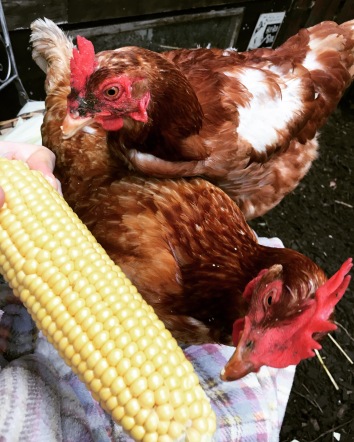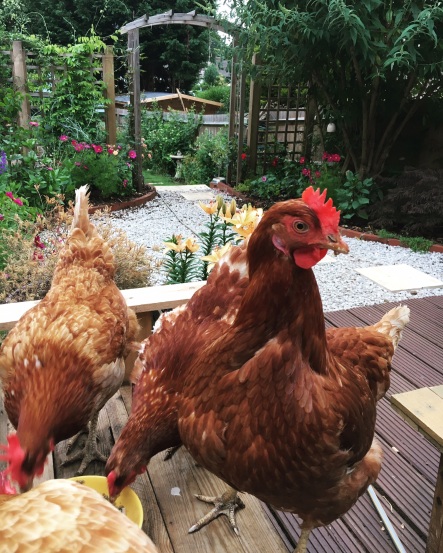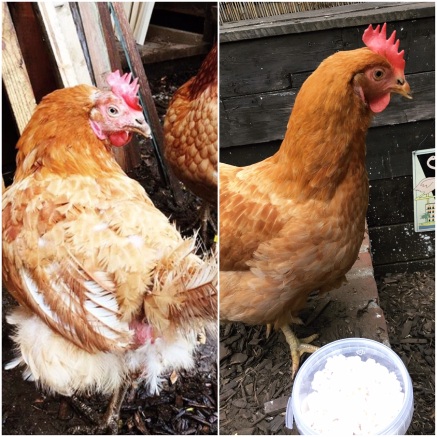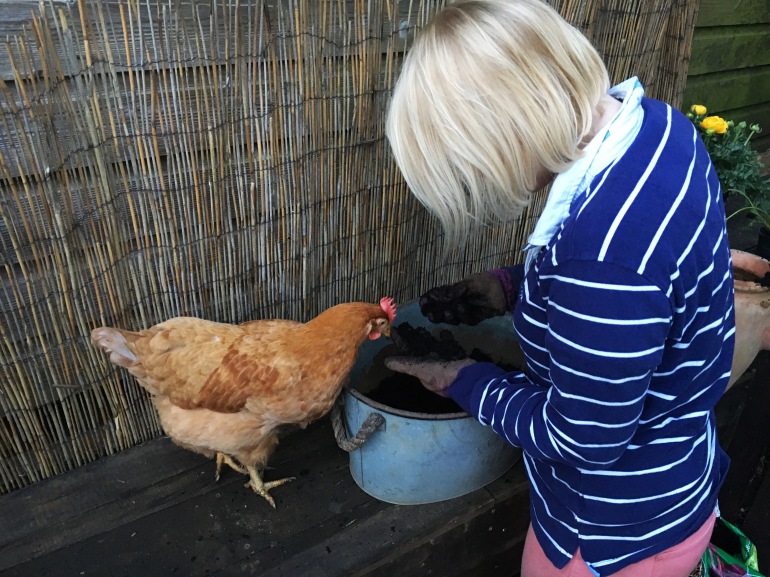The collective noun for chickens is a clutch or flock.
Whoever came up with this got it so wrong – they should have called it ‘a time theft’ of chickens. Alright, it’s not as catchy – but it’s more accurate. Every morning I take my coffee and wake up with the girls. Ten minutes turns into 45, and between them and the dog, I’ve spent a solid hour talking to the animals.

I’m fairly confident my neighbours think I’m slightly crazy. Whatever the weather they witness the morning walk – the fluffy dressing gown and wellies – sleepily making my way down the garden path to let the chickens out.
Fourteen months ago, we drove over to a farm to rescue three ex-caged hens. Having wanted hens since I was little, I’d done lots of reading. I thought I was prepared and under my care, they’d have long happy lives.
It turns out there was a lot to learn.
Their lives haven’t always been long, but they’ve always been happy.
I didn’t quite realise how much their little bodies had already been through before they made it to us, and over the last year I’ve been shocked when I found the first ‘lash’ egg (essentially a ball of pus) and spent evenings researching into treatments when we battled egg peritonitis – which sadly is common in ex-battery hens.
Here’s the girls’ first experience on grass:

I’m not here to write about the egg industry, but some background is important to understand the problems these girls face. At approximately 72 weeks, in order to meet consumer demand, chickens are culled and replaced unless, like in my case, they are rescued by a charity. Hens are therefore bred and selected to produce lots of eggs in a very short space of time – meaning that while some of them will continue laying for a while, some are sadly worn out. I read somewhere recently that the average lifespan of an ex-battery hen is somewhere between two and 12 months, which broke my heart a little bit – although some can live much longer.
Sweetcorn, hurrah! Even if my face is covered in mud…

Rescuing chickens was one of the BEST things I’ve ever done and I absolutely class them as pets. Their eggs are a bonus as I know exactly where they’ve come from and what the hens have been fed. In truth, I don’t really care whether they produce eggs or not. I want them to live out their days with sun on their back and dirt in their claws, but I also want to start putting everything I’ve learnt along the way in one place, in case it can help others looking to save some hens. I’ll put some of the illnesses and individual chicken stories in other posts, but here’s a starter guide of things I wish I knew before I got them:
*You absolutely will be able to tell them apart.
When we first got the girls, we got little leg rings to identify them. I remember being worried I might not pick up on one being ill if I couldn’t tell one from another. Little did I know, they all had such distinct personalities this was never going to be an issue, and the leg rings came straight back off. People think I’m mad when I say they have personalities like a cat or a dog, but I really mean it. Of our current girls, Bonnie is the most curious chicken you’ll ever meet, Ginger is a thug who will do anything for food, and Debs is a reserved sun worshipper. They also look completely different, but that’s a separate point!
*They are so much more intelligent than you realise.
There’s actually been quite a few studies recently about this – but hens are clever. Socially, their little pecking order is complex, but they absolutely know which pot has the sunflower seeds in and my morning routine. I know this because of how they get frustrated and sit by the greenhouse door when I haven’t got some scratch mix out. This intelligence will both surprise and delight you.
The dog isn’t looking, I’m going for his basket…

*Chickens poo. A lot. And you need to get to know it.
Those who know me know I’m not a fan of toilet humour. But seriously, chickens poo so much, and over the last year I’ve found poo is a great indicator of chicken health. The list of normal is SO long – and there are many great websites out there which document many different types for you to compare against. I’ve got to know the girls’ bowel habits – a sentence I didn’t expect to write. You can tell so much from their poo – if they’re sick, if their crop is emptying properly, if they’re stressed. I do a daily inspection and clean-up of their area, and I remember having a small heart attack the first time I discovered bright blue poo. It turns out they’d eaten some red cabbage. So yes, poo.
*Good house-keeping is everything.
This sort of links in with the amount of poo, but I can’t stress enough how important cleanliness is to maintain good health. Their litter tray and coop gets cleaned every morning. Food and water holders are sanitised weekly. Everything has a deep weekly clean in which the whole area is sanitised, and then a monthly clean where we dig out the run and add fresh wood shavings (we use dust-free horse bedding as it composts quickly). To keep clean and prevent mites etc, the girls need to enjoy a dust bath. But despite your best efforts, things will get muddy and the girls will constantly try to drink out of a dirty puddle rather than a clean water-holder – but I try my best.
Yes we like this food, many thanks.

*Chickens like to talk.
Every morning Ginger sings the most beautiful egg song. It can be heard by houses around, which is lovely, unless it’s summer and 7am and everyone has their windows open. I give the neighbours eggs and they really like the girls, so thankfully it’s not a problem! But I wasn’t prepared for the range of vocal abilities the girls would display. Their shrieks of excitement, their warning sounds (bird above, bird above!), their happy chitter chatter. It’s such a delight, and I find myself slowly learning basic chicken.
*Get a good vet before you need one.
This goes for all animals, but chickens are no different. I’ve spoken to people whose vets know nothing about hens – so join a forum and find your nearest avian vet. I’ve had people say ‘it’s just a chicken, you can’t take it to the vet’. My response is generally, screw you. I’d never let my dog suffer, so I have no intentions of letting my chickens suffer either.
*Become friends with your neighbours.
I have an amazing neighbour. I look after her quail and she looks after my chickens. We can both still go on weekends away and holidays and know the girls are receiving excellent poultry daycare.
*You’ll always want to give them more space. Extend their run just that little bit more. Rescue another perhaps?
This might sound a bit stupid, especially as they spent the first part of their lives in cramped conditions – but to flourish they need as much space as you can give them, because otherwise they get bored and feather-peck or fight. We have three hens, with a three-metre run attached, which they go into at dusk and dawn. From what I’d researched this was ample space – but in reality they always want more! The majority of their time is spent in an area which is roughly 25 metres squared, meaning it’s easier to keep everything clean and there’s always a new insect to chase. I was shocked the first time the hens were fighting to establish the pecking order – they can be vicious little gits. You should probably be prepared for that too.
CJ’s feather transformation was so rewarding.

*Be prepared for that extra broccoli to fall into your trolley.
Yes, you can budget and buy their layers pellets. And yes, this should absolutely be most of their daily intake. But you’ll buy them some fresh greens, and they’ll squeal with delight. Before you know it, they’ll be assaulting you when you haven’t delivered them a cauliflower. Then one day you’ll buy them a hanging-up seed-pecker with raisins as a treat, and hey wait, we’ve finished it chicken mum, and are you replacing that?! Luckily the allotment helps us supply them with fresh greens, but I’ve lost count of the times something has fallen into the shopping trolley for them.
*The first time they come to sit for a cuddle, your heart will melt.
I don’t really need to expand on this point, but when it happens, it’s really flipping special. The first time CJ (who sadly isn’t with us any more) snuggled down for no other reason than she just wanted to, well I was accepted. Knowing humans had caused her suffering, but she’d come to trust me, meant I was well and truly hooked to saving these little hens.
Really, this is the only point that actually matters – because saving chickens is the best.
To find out more or rescue some hens yourself, go and check out the amazing work of the British Hen Welfare Trust: http://www.bhwt.org.uk/



Chicken sitting your girls is the BEST thing, I get to walk through your beautiful garden, and then get mugged by the world’s most friendly hens!
LikeLiked by 1 person
I really enjoyed reading this and thanks for taking the time to put it here. So very true they are so very endearing and truly are so beautiful and Loyal like nothing else Ive ever encountered.At the moment im chickenless but cannot wait to get more 😊
LikeLiked by 1 person
I am rescuing 9 in December to go with my other 3 and can’t wait
LikeLiked by 1 person
Oh this is so exciting! Good luck with your new rescues – they’ll be free for Christmas, yay! Thanks for reading and commenting, Rach x
LikeLike
Really amusing! But very true and no I hadn`t got a clue before I got the Chickens Very well put
LikeLiked by 1 person
Thank you for the information I am or my husband is building me a coop so I can rescue a few hens so thank you for the information it is informative and useful 👍how do I register to get some hens please
LikeLiked by 1 person
British hen welfare or another hen rescue. Register, build and prepare.
LikeLike
Hi Annette, thank you for taking the time to read my post – that’s so exciting you’re rescuing some! I registered through the BHWT – but there are other charities as well, I know Fresh Start for Hens rescue too and there are some smaller charities as well. With the BHWT you need register with them in the first instance, and then call them. More information and rehoming dates can be found here: http://www.bhwt.org.uk/rehome-some-hens/
Good luck – let me know how you get on!
Rachel x
LikeLike
Many thanks for the information I have registered I just need to phone them up
LikeLiked by 1 person
You’ve perfectly captured my experience since rescuing my first flock 10 years ago. The only thing you missed out is the utter heartbreak when one of your precious darlings flies over Rainbow Bridge.
LikeLiked by 1 person
I know, they do break our hearts don’t they. I’m going to write a post about my (ssshhh, favourite!) hen CJ, and I’ll no doubt talk about my sobbing like a crazy lady in that! Thanks for taking the time to read and comment, Rachel x
LikeLike
I rescued 3 at 17 months old so am I right in understanding they could only live another 12 months ?
LikeLike
Hi Alison, that’s just the average lifespan, but there are lots of hens free who live for years. I spoke to someone once whose ex-batt had lived for over five years! Thanks for reading and commenting, Rachel x
LikeLike
When we kept chickens the eggs were bright yellow as were the Victoria sponges my son made with them.
LikeLiked by 1 person
hi I rescues 4 and kept them for 3 years 10 months and the 4th one passed she was 4.5 yrs old. When I joined this forum I was shocked to find some wee ones hardly make it after a few months so I was happy that I’d kept mines for so long after much trials and errors. I’ve not had any for 4 months and decided to have a break and reinforce my shed and run to keep them safe. Safer as I know the foxes are around. I’m rescuing 4ex Batts on Jan 1. A wonderful start to 2018 for me and the girls. Can’t wait to see them all grow and watch their little antics. 😊
LikeLike
Which antibiotics for lash eggs? Did you sterilize them with implant? (best method but illegal in the US, not illegal in other countries.
LikeLike
We’ve just adopted 3 ex battery hens and started them off in the coop and they’ve learned to go down the ramp but not back up in the evening. We have a big run but it isn’t a walk-in so it’s been really hard to catch them to put them back into the coop. The run is fox proof, which is where they have been sleeping and at night we completely cover it so the foxes can’t see in. How do we encourage them into the coop or will they eventually find their own way? How do you get them so friendly to pick up?
Thank you
LikeLike
I found this page when I was looking for answers as to why my dear little Elsa passed away. After rescuing her for seven months – she got comfort from being with me until the end, and knowing that, made it so much harder to accept that she has gone, and that my love wasn’t enough to keep her.
Your informative words have helped me to understand the affect the egg industry has on these beautiful girls and no matter how long we have them for, knowing they get to experience freedom is wonderful
LikeLike